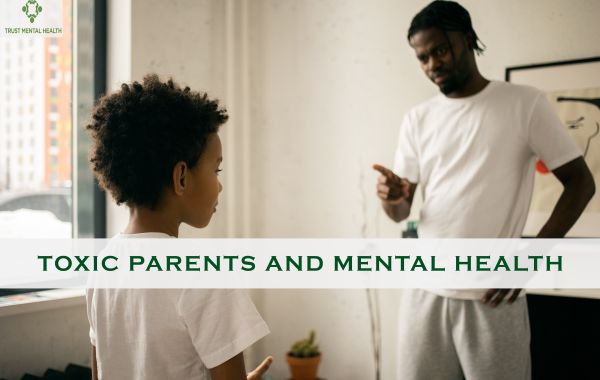What is Toxic Parenting?
A toxic parent is one whose negative patterns of behavior are consistent and dominant in a child’s life (Forward, 1989). The heartache felt by the child grows as they get older. The pain and burden of their childhood expands throughout their being and into their lives. The child carries the heaviness of guilt, not being good enough, shame, and lack of self-confidence as they grow up. The influence of toxic parents is deeply entrenched in the psyche of their adult children. Adulthood is where these deficiencies in self-worth manifest. The abusive dynamics affect daily functioning, relationships, parenting, friendships, professional life, identity and self-worth.
Emotion and thought patterns tied to a sense of self are set into a child’s psyche from a young age. Children of toxic parents blame themselves for the abuse they receive – they believe it is because they are doing something wrong. It is easier for a frightened or neglected child to hold this in his mind than the fact that their parent is unkind.
This strong attachment makes it very difficult for people to hold their parents accountable for mistreatment. Denying or rationalizing abuse may be less painful that admitting to oneself that a parent inflicted harm intentionally. A toxic relationship is not the same thing as a difficult or contentious relationship. Toxic parents cause emotional and psychological destruction.

What are the Traits of Toxic Parents?
Characteristics of toxic parents include but are not limited to (more than one may apply):
They tell you that you are not enough, not worth anything, or bad. You are excessively criticized or even called names.
Physical discomfort, abuse or threatening is used as a means of punishment or discipline.
Toxic parents make their children keep their home life a secret.
Children may be seriously neglected due to substance abuse by their caregivers. They have to occupy the same space as their intoxicated parents.
Neglect is also seen in homes in which caregivers are depressed or suffer from other types of mental illness.
The toxic parent will blame their problems on their children.
Communication is dysfunctional and the parent does not tolerate any contradiction.
Neither approval nor courtesy is not given to children in a toxic home. Boundaries are not respected.
Children are put in the position of caregiver to a parent who is either mentally ill, under the influence, or due to other problems the parent is having.
In toxic homes children are constantly afraid of doing or saying the wrong thing. They may be afraid to express feelings of anger or disagreement toward their parent.
Toxic parents are not understanding of the differing needs children have in each phase of development. They take personality quirks, differences in opinion, and the moods of their child as personal affronts.
Children grow up in a stressful, tumultuous environment without opportunity for them to actually have a childhood. Their attempts at asserting their independence are quashed. Any ‘lessons’ their parents teach them are aggressive and detrimental to the child’s dignity.
These characteristics present in your adult relationship with your parents in the following ways:
The belief that your parents will change and improve.
Feeling responsible for your parent’s happiness or mood. Believing that their unhappiness is your fault and that it is your duty to make them feel better.
Still feeling like you are not good enough and that nothing you do is right.
Having negative emotional reactions either before, during or after spending time with your parents.
Constantly seeking your parents’ approval in almost every area of your life.
Being manipulated by your parents through guilt, sense of duty or finances.
Your parent does not respect you as a person or your boundaries.
Your parent does not treat you as a mature adult.
How Parental Toxicity Affects Your Life as an Adult
People that have been raised by toxic parents have trouble maintaining healthy relationships in adulthood. They are more susceptible to getting caught in abusive or dysfunctional situations.
Your sense of identity is damaged and confused.
You worry about people liking you if they really knew you.
Fear of abandonment is prevalent in adult life. This is also linked to a fear of getting hurt.
There a degree of cynicism and pessimism overhanging everything. You may expect the worst from others, and from life.
You doubt yourself when you succeed and/or feel like a fraud.
Perfectionism. This is born out of the fear of getting anything wrong while a child. In many toxic households there is no room for a child to make a mistake. The parent will take any perceived misbehavior as a direct offense towards them.
A person who has grown up in a volatile environment finds that being spontaneous, relaxing, or enjoying themselves does not come naturally or easily.
You find yourself repeating the same patterns and behaviors as your parents.
Depression symptoms may present, along with anxiety and other mental wellness challenges.
Feeling worthless and unlovable can lead to self-destructive habits and/or addictions.
Parents are almost deified in the eyes of their child – their world begins and ends with their parents and children are completely dependent upon them. They are helpless and have no control over or defense against maltreatment. This parent-child attachment it what makes the toxic dynamic all-encompassing in the mind of a child. It is also what feeds the dysfunction in the adult they grow into.
We are told that we are answerable for the course of our lives and that we cannot blame our situation on others. This may be true, yet a child is not responsible for what happened to them. Parents are accountable for what they did to their children.
What you are responsible for is taking the time to heal and recover. As an adult, you may hide behind a lot of anger and resentment. Behind your defensive walls and underneath the layer of denial, you will find raw, difficult emotions. Inside is you, as a child – the inner child. This inner child still holds on to the fear, guilt, shame, hurt, confusion and despair. Processing these thoughts and emotions is not easy.
You may struggle with wanting your parents to acknowledge the disruption they have caused in your life. You may believe that if they were to just change, you would have a good relationship with them and be happy. You may worry that if you stand up to your parents or confront them, you will lose any semblance of connection with them.
Holding your parents accountable will strip away the image you have held of them for years. You will gradually see them for who they are and what they did. It is not easy to go over your past and realize how much of your parents’ behavior you have either rationalized or blamed yourself for. These wounds must be addressed through help from mental health services and therapy, such as depression therapy. In time, you can heal and recover.
If you are struggling with reconciling your childhood and your relationship with your parents, or need any type of support related to mental wellbeing, Trust Mental Health can help. We have a diverse team of compassionate, experienced therapists who speak numerous languages.








